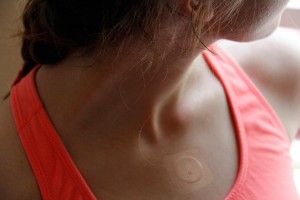-
 Health & Wellness
Health & WellnessMayo Clinic and Gentag, Inc. Announce Agreement To Develop Wireless Sensors for Treatment of Obesity and Diabetes

ROCHESTER, Minn. — Mayo Clinic and Gentag, Inc. have reached an agreement to develop the next generation of wearable biosensors designed to fight obesity and diabetes.
“We are hoping that this technology will be game-changer. These patch biosensors may help us reduce global obesity and diabetes,” says James Levine, M.D., Ph.D., a Mayo Clinic endocrinologist and obesity researcher. “They are accurate, inexpensive, and can be integrated into the care people receive."
A first-of-its-kind, the wearable patch sensors are the size of a small bandage, and are designed to be painless, wireless and disposable. In the bandage is a sensor that communicates via a closed-loop diabetes management system which is compatible with cell phones. The system will allow researchers to monitor movement and develop treatments for obesity and related conditions.
MEDIA CONTACT: Brian Kilen, Mayo Clinic Public Affairs, 507-284-5005, newsbureau@mayo.edu
A joint intellectual property (IP) agreement with Mayo Clinic made the research and development of this tool possible. Gentag signed a patent pooling agreement with Mayo Clinic for the management of IP related to wearable patch sensor and wireless communication technologies. Under the agreement, certain patent rights and technologies of both Mayo Clinic and Gentag will be combined and commercialized.

The two firms will collaborate with third parties under license to bring Mayo Clinic’s expertise in medicine and clinical practices to the public by the development of the next generation of wearable skin patch technologies from Gentag in the areas of diabetes and obesity management. More than 50 issued patents and technologies are being offered for licensing under the agreement.
“We are thrilled to be cooperating with the Mayo Clinic on these amazing new wireless technologies,” says John P. Peeters, Ph.D., the CEO of Gentag. “We look forward to working with the medical device community to get this technology into the marketplace.”
Additionally, Mayo’s Micro-Miniature Transceiver chip will be combined with Gentag’s radar-responsive tag technology and integrated under license to create a new type of communication chip that will combine Near Field Communication (NFC), Body Area Networks (BAN), as well as long-range wireless communication and geolocation.
About Mayo Clinic
Mayo Clinic is a nonprofit organization committed to medical research and education, and providing expert, whole-person care to everyone who needs healing. For more information, visit http://mayocl.in/1ohJTMS, or https://newsnetwork.mayoclinic.org/.
About Gentag
Gentag, Inc. is pioneering the use of disposable, ultrathin, wearable and immunoassay biosensors that can be read with NFC-enabled devices, which will make healthcare and consumer diagnostics more affordable and accessible to all worldwide. These products and services will revolutionize not only medical applications, but also location-based services and the detection of environmental threats in homes and workplaces. Gentag’s first wireless sensor network patent was filed in 1997. All Gentag NFC patents are held by Altivera, LLC, a Maryland company operated by Gentag and owned by its shareholders. For more information, visit www.gentag.com and follow Gentag on Twitter (@gentagInc).
For licensing rights under the joint Mayo-Gentag agreement, please contact:
Bruce R. Kline
Technology Licensing Manager II
Mayo Clinic Ventures
200 First Street SW
Rochester, MN 55905
Phone: 507-266-4586
Fax: 507-284-5410
Email: kline.bruce1@mayo.edu
John P. Peeters, Ph.D.
President and CEO
Gentag, Inc.
3299 K Street, NW, Suite 100
Washington, D.C. 20007
Phone: 240-994-2236
Fax: 301-913-0350
Email: john.peeters@gentag.com
Media Contacts
Brian Kilen, Mayo Clinic
507-284-5005
newsbureau@mayo.edu
Marc Onigman, Gentag
Phone: 617-413-2830
Email: marc.onigman@gentag.com
Related Articles







